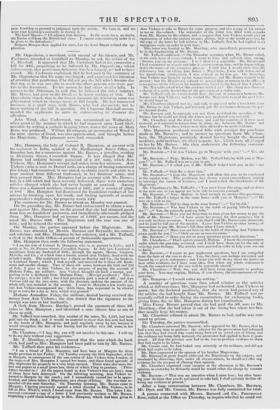Mr. Oppenheim, a merchant, with several of his friends, and
Mr. Cashmore, attended at Guildhall on Monday, to ask the advice of Sir C. Marshall. It appeared that Mr. Cashmore had in his possession a bill for 300/., purporting to be indorsed by Mr. Opponla im ; which indorsement, that gentleman, believing it to ben forgery, whhed to have erased. Mr. Cashmore explained, that he had merely the assurance of Mr. Oppenheim that his name was forged ; and expressed his intention of arresting that gentleman if he did not pay the bill which became due that day, as lie was not able to reach the other persons who were par- ties to the document. To his sorrow he had other similar bills. In answer to the Alderman, he said that he believed the other indorser, Mr. Moses, had gone to the I )evil, as he knew nothing of him. Mr. Oppenhehn stated, that in the forged signature his Christian name was abbreviated, which lie always wrcitc at hill length. He had transacted business, in a small way, with Moses, who had absconded ; but he knew nothing of the bill in question. Sir Chapman Marshall recom- mended the applicants to unite in endeavouring to discover the offenders.
John 'Wood, alias Underwood, was reexamined on 'Wednesday ; when proof of the manner in which he had imposed upon Lord Skel- rnersdale by writing a pathetic begging letter, under the name of Mary Burn, was produced. William Hemington, an accomplice of Wood in the same species of fraud, was also apprehended, and brought before the Magistrate. The prisoners were both remanded.


















 Previous page
Previous page